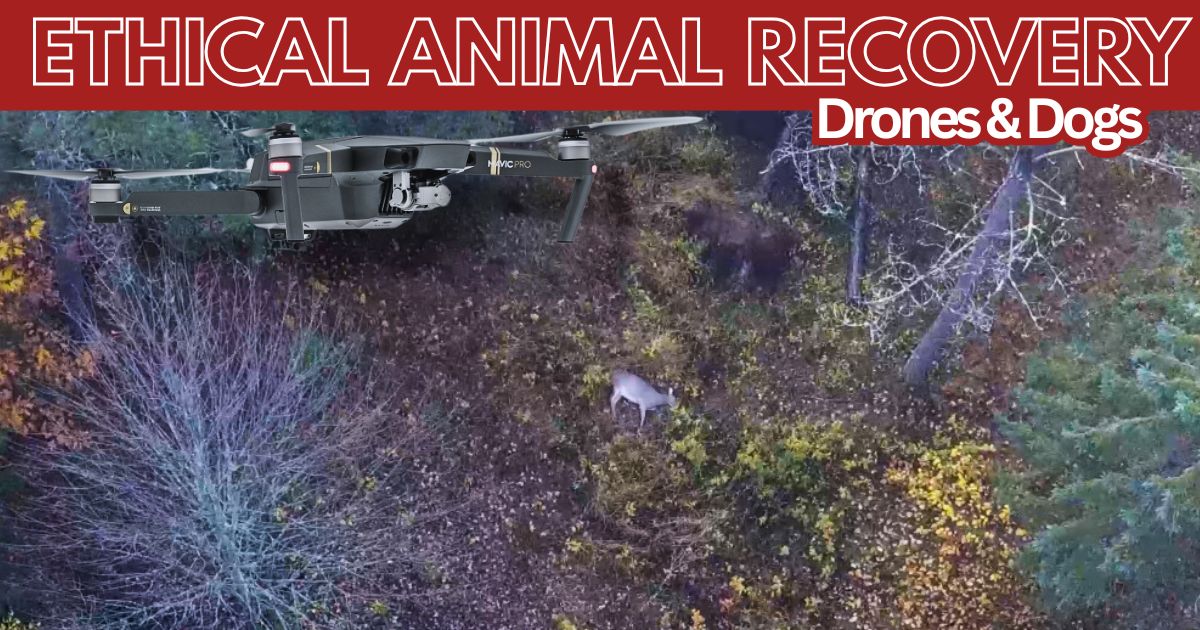Every responsible hunter knows that recovering a wounded or harvested game animal is not just a courtesy—it's a fundamental principle of ethical hunting. Yet, even with the best intentions and precision, there will always be challenging conditions that make tracking and recovery tough—dense forests, bad weather, or rugged terrain.
In the hunting community, we have the tools to address this issue, but some methods, like the use of drones or trained dogs, remain contentious or under-regulated in many regions. We argue in support of using both drones and trained dogs for game animal recovery.
The Hunter's Responsibility in Recovery
Ethical hunting goes far beyond making the perfect shot. It includes ensuring that every effort is taken to recover wounded animals and reduce waste. This responsibility isn't just tradition; it's about respecting the wildlife we hunt, honoring the hunt itself, and ensuring that every harvested animal is put to appropriate use.
Unfortunately, even experienced hunters can face obstacles in fulfilling this obligation. A shot fired at the perfect moment can still result in an animal moving a considerable distance after being hit. Factors like thick brush, poor visibility, or fading daylight can make tracking difficult, even for the most skilled trackers.
This is where tools like drones and trained dogs come into play. These solutions—one rooted in modern technology and the other in centuries-old tradition—make it possible to enhance our ability to recover game efficiently and ethically.
How Drones Can Transform Game Recovery
Recently, drones have become an invaluable tool across various fields, from surveying land to aiding search-and-rescue operations. Their potential for assisting in game recovery is undeniable.
Advantages of Drones for Hunters
- Enhanced Visibility
Drones provide an aerial perspective that allows hunters to scan large areas quickly. Using drones equipped with thermal imaging can help detect a wounded animal in dense foliage or low-light conditions.
- Efficiency in Difficult Terrain
When hunting in remote or rugged areas, drones can provide insights into places that are otherwise inaccessible to hunters without extensive effort or danger.
- Minimized Time and Animal Suffering
When recovery happens faster, wounded animals are less likely to suffer unnecessarily. Immediate recovery also reduces the chances of predators scavenging the animal before the hunter can locate it.
It's important to note that drones should only be operated under proper certification and regulations to ensure that they do not disrupt wildlife or other hunters in the area. Devices used solely for recovery, not live tracking during the pursuit, keep the hunt ethical while maximizing recovery efforts.
Minnesota, in particular, has the opportunity to lead the way by allowing certified individuals to assist with recovery efforts via drone technology. With clear boundaries for their use, the state could encourage an innovative and ethical approach to game recovery that modern hunters can stand behind.
Trained Dogs: A Timeless Ally for Hunters
While drones represent the future, trained dogs remind us of hunting's past. Dogs have been the companions of hunters for centuries, with some breeds specifically developed for tracking and retrieving game. Allowing the use of trained dogs for recovery is a vital part of preserving ethical hunting practices.
Why Dogs Are Still Essential
- Superior Tracking Ability
A dog's sense of smell is unparalleled when it comes to locating wounded animals. Blood-tracking dogs are remarkably effective at identifying scent trails, even when they’re faint or hours old.
- Complementing Human Skills
While hunters have keen tracking skills, dogs add a level of precision and efficiency that humans simply can’t replicate, especially over vast or challenging terrains.
Proper Training Is Key
For the use of dogs in game recovery to remain effective and ethical, training standards must be upheld. Dogs should be well-trained to stay focused on the task, minimize disturbance to other wildlife, and safely retrieve or lead hunters to the wounded animal.
Overall, dog-assisted recovery beautifully blends tradition with modern hunting responsibilities, reinforcing the respect hunters have always held for the game they pursue.
Why Minnesota Should Support These Tools
The hunting community already understands the importance of ethical recovery, and it’s time for lawmakers in Minnesota to fully recognize the significance of these tools.
By allowing the regulated use of drones and trained dogs for game recovery, Minnesota would be taking a step toward modern and responsible hunting practices. Hunters aren't asking for shortcuts; they're seeking reliable ways to ensure that no harvested animal goes unrecovered.
Opposing these methods runs counter to everything ethical hunting stands for. There’s no valid argument against using all available, responsible means to honor the game we pursue. Both drones and dogs allow hunters to maintain the balance of tradition and innovation in the field, ensuring we respect the creatures we hunt while abiding by longstanding principles of conservation and ethics.
Ethical Hunting
At its core, hunting is about tradition, respect, and responsibility. By advocating for tools like drones and trained dogs, we're ensuring this tradition continues in the most ethical way possible. Technology and tradition can coexist, allowing us to evolve as hunters while staying true to the values that define our community.
Minnesota has a chance to set an example for other states by supporting these recovery methods. If you're a hunter who believes in upholding ethical practices, now is the time to make your voice heard.
Join the conversation and support ethical hunting practices in Minnesota. Encourage lawmakers to recognize the importance of drones and trained dogs for game recovery by reaching out to your representatives and sharing your perspective with the community.
By championing these tools, we pave the way for a future where hunting remains a respectful, responsible, and sustainable tradition.


